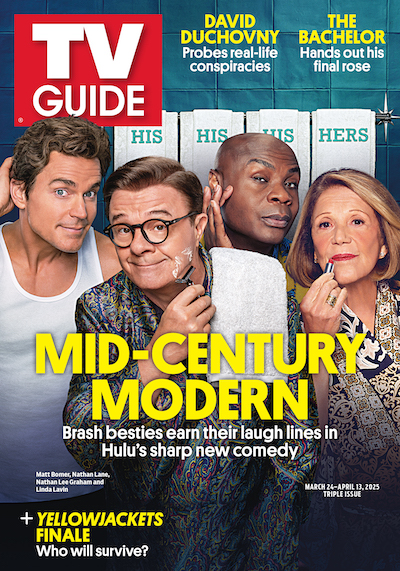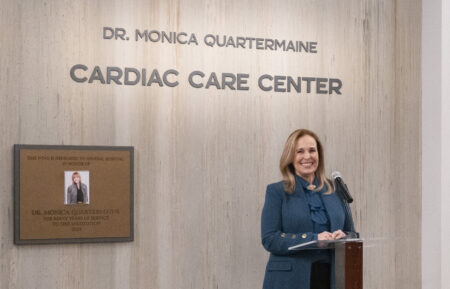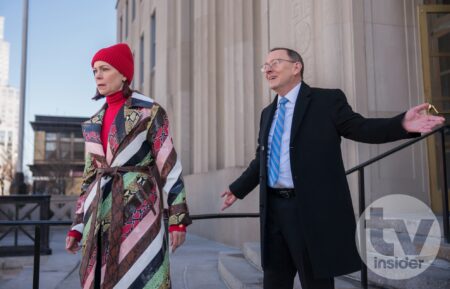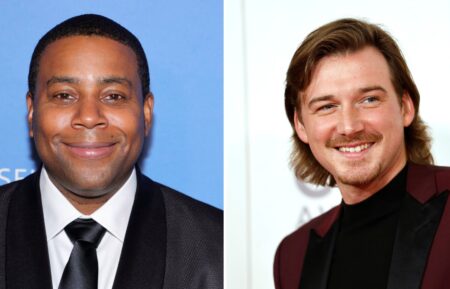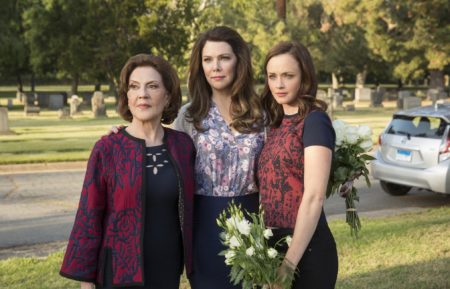‘You’re the Worst’ Season Finale: Why the Show Ended With Big Decisions (and What’s Ahead)
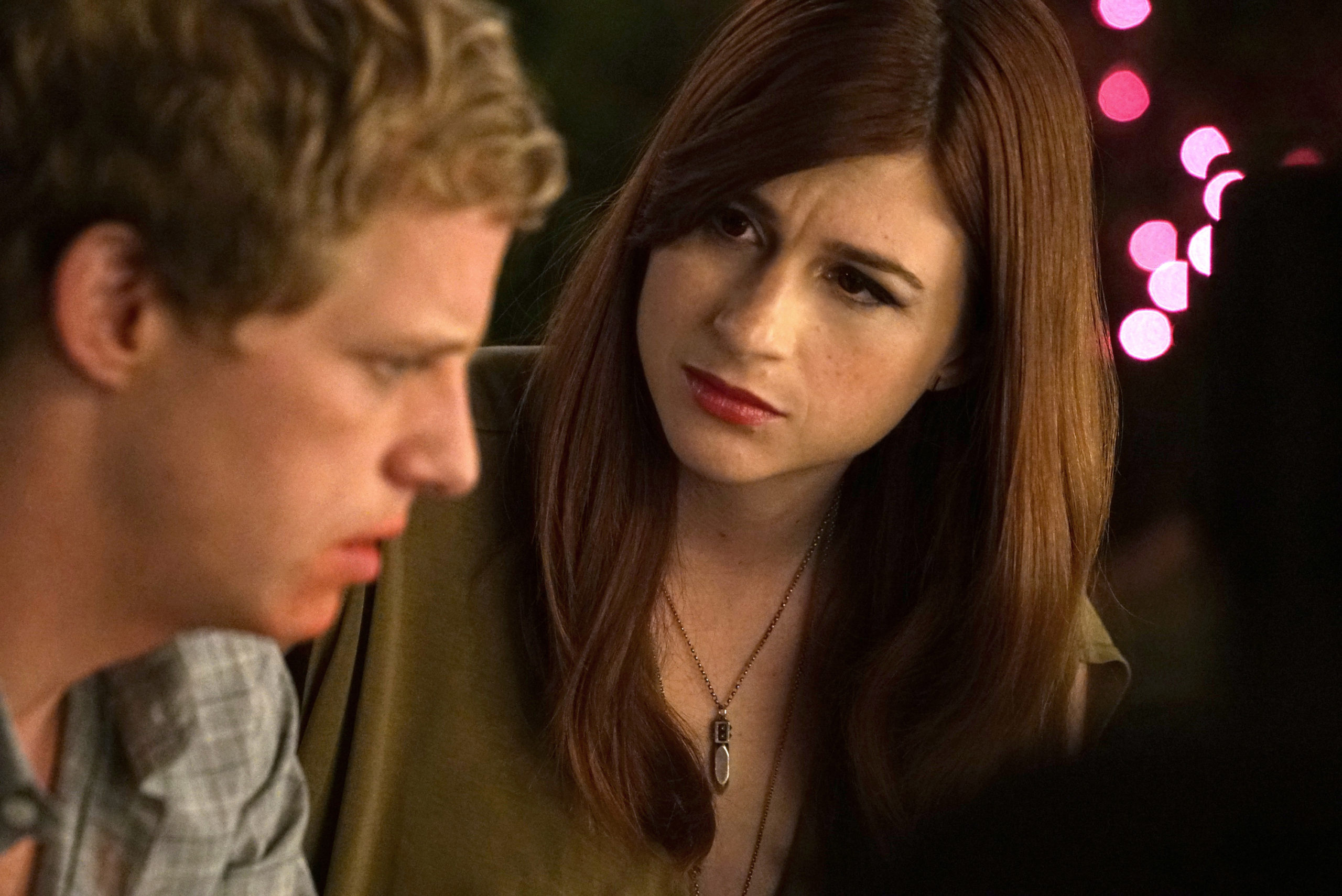
Spoiler alert! Do not read this unless you’ve seen the You’re the Worst Season 2 finale!
You’re the Worst ended its extraordinary second season with several characters making important decisions: Gretchen (Aya Cash), who struggled with depression this year, told Jimmy (Chris Geere) she would pursue medication to make her illness more manageable and that she loved him, too (in response to Jimmy saying “I love you” first in his sleep); a newly-pregnant Lindsay (Kether Donohue) reunited with her estranged husband, Paul (Allan McLeod)—and immediately regretted it; and Edgar (Desmin Borges) nearly wrecked things with Dorothy (Collette Wolfe), but she later revealed she thought it had been a fight, and that they were fine.
So what comes next for the just-renewed FXX comedy? We spoke with showrunner and executive producer Stephen Falk to get the details.
Congratulations on the Season 3 renewal! How long did you know the show would continue on?
I had known for a little bit—maybe a week or so [before it was announced]. I’m incredibly grateful and excited, mixed with a tiny bit of, “Oh, s—, we have to do this again.” I felt like I had just finished posting the last season, so it was a little bit like, “Oh, God, I only have a month left.”
How much will the overall deal, which has you working on other projects, shift your focus away from the show?
I don’t think it’s going to change the amount of time I work on the show. Even last year, I was writing a movie at the same time I was writing the season. If anything, working on some other projects for the network will just take the extra part of my brain that needed to be doing something at all times anyway.
At what point in crafting the show’s arc did the writers decide to have the emotional story climax come in the penultimate episode?
It just sort of came naturally in developing the season. I think there was a lot of talk in the writers’ room of not wanting to [have] the emotional climax and then give the impression, “That’s solved, then. That was easy.” We felt we needed another episode not to…have a sense of the process. It’s not [Jimmy] did something romantic and it solved a mental illness. We felt we had more road to tell, and we needed time for Gretchen to say what she says in that last scene in the finale, when she makes the decision [to take care of herself]. That was the point of the season: the notion of making a sacrifice or change for someone else. That’s the definition of love they all reject in the premiere episode.
With Gretchen opting to pursue medication for her depression, how will this decision impact the writing of the character?
I don’t anticipate doing anything to change Gretchen fundamentally. I think, if anything, we would strive to show Gretchen is a f–king mess, but it’s not because of this. It’s not like all of her problems came from her periodic bouts of terrible depression. I think what makes human beings so complicated is, every time you think you have people figured out or diagnosed or pinpointed or characterized, they go and show they’re way more complex and messy than you think. It would be easy to categorize everybody, but I don’t think we’re able to do that with Gretchen. I can’t imagine we’re going to dwell on her trying to find the right medication. I think that would be boring, and I’m sure someone will write on a board somewhere, “What about the medication? Why aren’t we seeing what’s going on?” I don’t think it would make the most interesting television, but we’ll make sure to give voice to it.
Were there any versions where Jimmy didn’t stay with Gretchen, or perhaps got closer with Nina?
I think there were definitely degrees of things with Nina. But I don’t think we were ever having [Gretchen and Jimmy] break up; that’s the heart of the show. We wanted to keep them together, but pull them apart as much as we possibly could, and still get them back together in an expedient fashion.
Now that they have said “I love you,” where will they go next?
I have a list of things I’d like to accomplish next season. As I’ve been watching the season, I’ve written down some things I missed, things I feel we haven’t had enough time to get into that much. I don’t have a master plan, yet. But there’s always a road forward in charting a plan of a typical relationship—which is what we try to do, but with these two s—heads.
On paper, Lindsay has what she wanted: she’s pregnant and back together with Paul, but she had that moment at the end where she was clearly not okay with things. What’s in store for her?
I do think the last thing we saw of her is probably an emotion that won’t go away: “Wait, what the f–k am I doing on a sidecar?” I think it’s like the Arrested Development quote: “I’ve made a [huge] mistake.” [Laughs] Now, whether she tries to dig in and prove it wasn’t a capricious mistake, or if she immediately flails and tries to find a way out of it, I don’t know. But, it’s probably going to be part of a larger discussion of what we want to do with the season.
When series regulars get love interests who are a guest stars, those relationships generally don’t last all that long. Why did you decide to keep Edgar and Dorothy together?
I had worked with Collette; she was the lead of a show I did for NBC [Next Caller]. I love her as an actress, I fought for her for the role and I love writing for her. As soon as I started thinking about Collette and the possibilities for her character, I started getting more excited. I also have an aversion to so many love interests coming and going on shows. I think it makes for less compelling storytelling, and the audience gets trained to not invest in anything. And, secondly, it doesn’t allow you to cast the best actors. That said, I wanted Edgar to really find some happiness. I felt like we had a lot of fun making him the whipping boy, but I didn’t want him to be the Jerry/Gary [from Parks and Recreation] of the show. Yes, the show rewarded him with Christie Brinkley and a ridiculously, ludicrously happy family life, which is great. [Laughs] But I love my characters, and I do want them to feel joy occasionally before I beat them up.
There were versions where [Edgar and Collette] did break up at the end. At the last minute, I pivoted. That’s what we do in the writers’ room a lot. I’ve trained the writing staff so that whenever there’s a big decision, or a small decision is made, we stop and examine the opposite. What if that character—to make a really big example—doesn’t die? What if, instead, he goes to the party? Is that more interesting? And often when you’re planning something, you go, “Oh, s—,” and it leads to more interesting things. Or then you go, nope, and be more secure in the fact that your first decision was the right instinct. When they were going to fight at the party, that was going to be it. But we said, “What if it’s not? What if Edgar chases after her and she wasn’t breaking up with him, because life generally isn’t that over-reactionary and succinct.” People have fights, make up, and find a way to go on from there. It felt like a very human theme, and a good place to end what was a very human relationship. I don’t know where it goes from here, but I’m happy to keep them together.
Now that you’ve had a second season on FXX, are there any noticeable differences from being on FX the first season?
There’s a perception you’re being demoted to the minor leagues [from FX to FXX], which continues in some ways. There’s the issue of it being in a significantly less number of households, which can be problematic. John Landgraf is the smartest person in television, and he knows that branding a network is important, that having strong shows with an identity is important, and there’s value to be had in programming, even niche programming as we—as it turns out, to my chagrin—are. It is less important [overall], but it is a thing where people haven’t heard of us. Or, if awards are coming up, I do think the fact that we’re on FXX means Aya or Chris might not be in those conversations as much, [though] I think they definitely, definitely should. I would argue, to my death, that if Aya’s not nominated for some s—, it’s not just. And I think Chris is doing stealth [work]. I think they’re doing amazing work.
You’re also fairly active on social media. What reactions have you received about the depression arc?
I would say 99.7 percent are very positive. There are a handful of people who are like, “This depression s–t is boring! Where’s my fun comedy with boobs, like last season?” There are even a lower number, like three or four, who complain that this is not how their depression works. But then, from the people who are overwhelmingly onboard, there is a small contingency who have experienced clinical depression (whether first-hand or indirectly), who talk about how great it is to be represented. I had someone say she was going to make her husband watch, so he could understand her better. It’s really nice to get people saying you’re helping them. It’s certainly not what I set out to do, but it’s fantastic. The vast majority are along for the ride of the drama, and the couple, and they don’t want to see Gretchen be sad: “Oh my God, I don’t want her to be sad anymore” [versus] an “Ugh.” It’s been gratifying to see people really react. I was very scared to do this storyline, but it turned out really well.
Is there anything about Season 2, aside from the depression, that you’re especially proud of?
Aside from the way Aya and Chris played that, I love the range of colors we found for Kether. It’s about the depression storyline, but we got to see her be a really good friend in a few key scenes, along with being a complete f–king lunatic and borderline incompetent. Watching someone not have a handle on small things like how to get home, let alone how to pay her utilities, just cracks me up.
I really like the improv storyline. It’s been tons of fun to do, and it’s been really nice to get Edgar away from being thought of as just a veteran, even in his own mind. Even if Jimmy never got to see it, and a lesbian doppelgänger was in his seat. One thing that I love is some of the side characters, like Vernon, got a lot of chances to grow—and, yes, grow in horrible, disgusting and ridiculous ways. FX was kind of worried about some of the goofier humor and some of the goofier characters, like Vernon, last year. I stuck to my guns and said, look, I think he functions for a very specific purpose, and I think he’s f–king funny. And after the first handful of scripts, one of the executives called me and said, “We were completely wrong. Vernon is now our favorite character.” Anytime you can get an executive to say they were wrong, a) it’s a big triumph because they rarely do, and b) you know you’re at a good network, because they’re willing to admit they were wrong.
I have to ask: do you think you’ll do a third Sunday Funday next year?
I initially said no. It would run the risk of seeming like it was calculated. But, I had an idea while I was sleeping the other day, and rarely do those ideas amount to anything after you truly wake up… It was an idea that still, in my waking hours, is sticking with me. So never say never.
You’re the Worst returns to FXX in 2016.
From TV Guide Magazine
How Hulu's 'Mid-Century Modern' Is a 'Golden Girls' for Our Times
Settle in for some older and bolder laughs with the BFFs of a certain age in the new comedy starring Nathan Lane, Matt Bomer, and Nathan Lee Graham. Read the story now on TV Insider.

